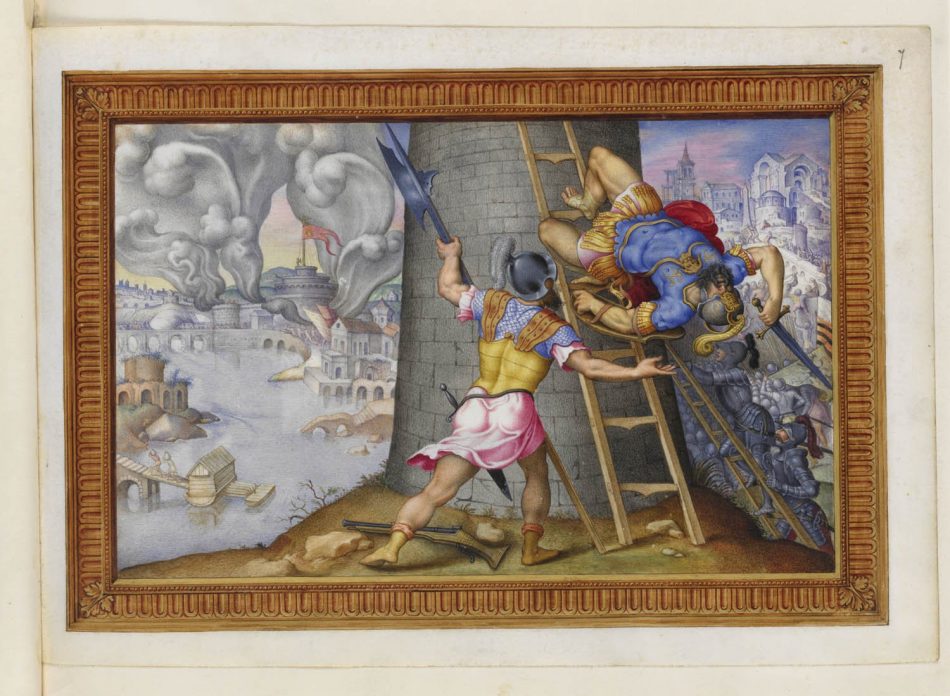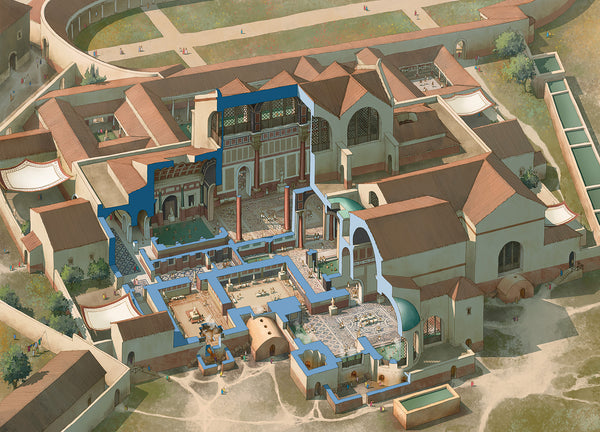An eyewitness account of the Sack of Rome in 1527
Our new issue of Medieval Warfare magazine will feature the Sack of Rome, one of the saddest events of the 16th century. A combination of foolish decisions and greed would lead an imperial army to Rome in May of 1527.
This translation of a Spanish eyewitness's account was made in the 19th century, so it is a little dated - we modernized a few words - but it captures the terrible events of how the city fell to imperial troops (coming from Germany, Spain and parts of Italy), and the destructive pillaging that happened afterwards. The writer notes that a couple of days before the Roman forces had captured a few scouts from the imperial side, but when the army commanded by Charles de Bourbon reached the city they immediately attacked:
The army, sir, advanced with such rapidity, that, on Monday, the 6th of May, - leaving behind them the heavy artillery wherewith to batter the walls - a party of Spaniards carried by escalade the strongest point of Rome, that part lying between the Belvidere and the gate of San Pancratio; and, I may almost say, that in one moment they carried the Borgo. The Spaniards fired at the Pope during his flight from the Vatican to the castle of St Angelo, and, had they been quicker - by the time one might say three credos or so - they would have caught his holiness in the Vatican. In the space of one hour they killed so many people in the Borg, that none but those who could manage to find refuge in the castle of St Angelo escaped with their lives. I heard say that the loss on the side of his holiness is above six thousand - nay, some go far as to say eve eight thousand men - while the imperialists have not lost above a hundred men, and these were chiefly killed by the artillery. It was like a miracle; but the cruelties which the imperialists have since committed detract somewhat from the idea that this miracle was performed from any merits of theirs. But, as these matters are God’s secrets, and the sins of this people have been exceeding great, God alone knows the cause why such persecution had befallen them. We have, likewise, had our share thereof, since no respect was shown to any one, whatever his nation or condition, his quality or estate.
This same Monday, sir, and before the assault, Monsieur de Bourbon, seeing the small which the Pope and the Roman people took of his coming, did send a trumpeter to invite the Romans to send some person or person with whom he might treat concerning the delivery of the town into his hands, so as to save Rome from being sacked; and Senor Renzo de Cheri Ursino, who had been made captain-general of the Pope’s army, dismissed the trumpeter with rough words. This did anger Bourbon, and add more fury to his assault. In order to animate his own people Bourbon placed himself in the front rank, and was killed in one of the first discharges by a shot from an arquebus. This death of Bourbon was the cause of three parts of the mischiefs and cruelties which did not afterwards ensue, seeing that, even had Rome been sacked, the pillaging would have lasted one day instead of nine or ten, as it actually did; during which time the imperialists were unceasingly plundering and killing; or torturing people to make them discovered were their money and goods were concealed.

The death of Charles de Bourbon depicted in a 16th century work.
The Spaniard notes that he himself and the people in his house also had to pay a ransom of 2400 ducats, but escaped unharmed. He considered himself very fortunate, adding that “during nine or ten days, not a moment passed in which I and the others did not expect instant death.”
He then returns to describing the terrible scenes being committed in Rome:
The ambassador of Portugal, sir, was in one of the strongest houses in all Rome, and, for this reason, as well as on account of his position, much people with their linen, their money, and their jewels, had taken refuge in his house, and the ransom of these people was estimated at one million of gold. But the house was, nevertheless, pillaged, and all the people made prisoners, so that the ambassador had not even a shirt or a cloak left him; but went about in his drawers, and in a doublet; nor had he, or anyone else his househ, any one thing left to them in this world. They made no difference between Spaniards or imperialists - no respect was paid to anyone. Rome will not be what it was before for fifty years to come. The screams of the women and children, sir, in the streets, were sufficient to break a man’s heart. In many parts there were so many dead bodies that it was almost impossible to walk; and, as they lay many days unburied, these bodies, together with carcasses of the dead horses, did cause such a pestilent smell, that for the certain the plague will much increase, unless, indeed, God brings some remedy.
There has no remained, sir, one church, one convent, one nunnery, which has not been pillaged, many of the clergy, many friars and nuns, have been put to torture, to force them to discover the money and the linen which peradventure might have been concealed in their houses. The nuns did scream frightfully while the rude soldiers were dragging them through the streets, and ill-treating them - it was enough to melt a heart of stone!
The church of St Peter is utterly plundered, the gold and silver containing the sacred relics taken away; the relics scattered about the floor, so that nothing can be distinguished. In this same church of St Peter many dead bodies do lie about within the very chapel dedicated to St Peter. Close to the very altar there are pools of blood; nay, even the carcasses of dead horses are to be seen there.
This letter was translated as "The Sack of Rome, 1527: From an Original Spanish Letter," in the January 1848 issue of Holdens Dollar Magazine of Criticisms, Biographies, Sketches, Essays, Tales, Reviews, Poetry, etc
The story of the Sack of Rome is told in Issue IX:3 of Medieval Warfare - click here to learn more.


2 comments
“Modernized a few words.” Yes. Modernized the archaic English perhaps, but the original text was probably written in old Castilian (similar to that of Cervantes), if you’re familiar with it. That which was modernized was the English translation, not the original Spanish. If someone is interested in teasing the old Castilian into modern Spanish, and then into modern English, I imagine the text is available for the purist.
“(I)t is a little dated – we modernized a few words”. Really? Is that commonly done in a history publication? I don’t see the necessity. Don’t you trust your readers to be able to handle the original text?